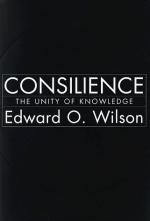
|
The Ionian Enchantment
• The idea of unification of knowledge is a result of evolutionary theory, and the new forms of classification instituted by Lamarck.
• Wilson traces his consilience back to Thales of Miletus, who proposed that simple laws underlay all forms of knowledge.
• Having been raised Southern Baptist, Wilson chose to search for objective reality rather than revelation or God.
The Great Branches of Learning
• Consilience links natural science, social science and the humanities.
• Government policies are often made by people without scientific training.
• Consilience would require schools to teach more science, and to integrate science into the humanities curriculum.
The Enlightenment
• Intellectual unification of knowledge emerged from the Enlightenment, where people began to believe in the idea of natural laws, and also natural rights.
• Philosophers Locke, Rousseau, Condorcet, Bacon and Descartes pioneered the universality of sciences and knowledge that Wilson presents now as consilience.
• Postmodern fragmentation has...
|
This section contains 627 words (approx. 3 pages at 300 words per page) |

|




